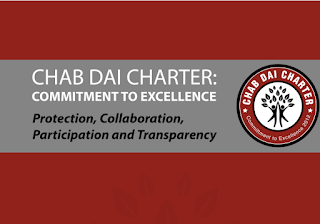This week saw the official launch of our new Charter online
database at the Chab Dai Charter feedback meeting here in Phnom Penh. Member
organisations travelled from as far as Siem Reap and Battambang to show their
continuing commitment to excellence, through the Charter’s set of professional
standards in combating human trafficking and abuse. With this in mind, we’ve
put together a short guide on everything to do with the Charter, how it works
and how it can benefit organisations.
What is the Chab Dai Charter?
 Chab Dai created the Charter in 2011 in order to give our
members and ourselves a common set of 15 principles to work towards, grouped
under four core values: Protection,
Participation, Transparency and Collaboration.
Chab Dai created the Charter in 2011 in order to give our
members and ourselves a common set of 15 principles to work towards, grouped
under four core values: Protection,
Participation, Transparency and Collaboration.
Moreover, the Charter is designed as a practical tool,
containing specific action points in order to achieve these principles. By
self-evaluating on everything from encouraging creative thinking at work to
being mindful of inclusion, we can continue to raise our standards as a
coalition.
How is the Charter implemented?
The practical side of the Charter was actually created using
feedback from our members. Charter-Doorsteps Team visit member organisations
and guide the staff through a participatory process of self-evaluation, with
each staff member scoring criteria based on how they think the organisation is
doing. These could be provision of specific trainings, procedural points, like
how to raise an issue about a senior member of staff or PTSD staff care for
those dealing with trauma in their day-to-day jobs.
A report with Improvement Action Plans (IAPs) is then
produced, based on the collected scores, which the organisation can use to
identify strengths and implement changes where needed. Learning grants are also
given to selected organisations that may need extra resources to complete the
process and staff are also encouraged to share lessons learned at our training
events.
The Charter database
The new database, designed by Rob Perrett, allows Charter
members to record and update their information and assessments instantly
online. It also enables NGOs to produce data for use in donor reports, with
information already packaged into charts and recommendations, saving a lot of
staff time.
 What our members
think
What our members
think
Reuk Saray of WEC and Bridge of Hope project told us about
his experience of the Charter implementation:
“When I first started
with WEC, no one introduced me to the Child Protection Policy – I just signed
without knowing anything about it. Now, we understand the importance of what it
is and how we need to protect children.”
Destiny Rescue’s Kimbra Smith also had lots of positive
things to say about the Charter.
“Just spending time with other members, our staff benefit
from hearing about other’s strengths and weaknesses. Once they have connected
with other staff, they feel comfortable contacting them to ask questions or for
resources. They then feel like they can hold their head up high and be proud of
their development.”
The Charter around the globe
The Charter has proved so effective that it’s been used as a
model for our partners in places as diverse as Costa Rica, Fiji, Indonesia and
Thailand, with one team saying it was ‘the most practical tool for assessment
they had ever used.’
The Charter has made a huge difference not only to our
members but to us as well - Chab Dai was the first organisation to go through
Charter process. To us, it means always striving for best practice when it
comes to supporting survivors of abuse in all its forms, and doing this
together as a coalition.
As one member said: “It’s not realistic that organisations
can be perfect in every way, so we are very positive about the Charter – we
show other members our IAPs to show them that we need to improve too!”


No comments:
Post a Comment